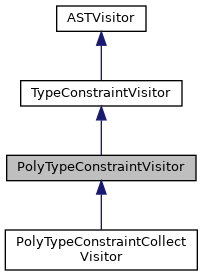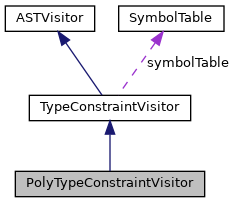Visitor generates polymorphic type constraints and collects them. This visitor is called for a function with the requirement that all called functions already have a generalized type computed in the given function polymorphic type inference map. More...
#include <PolyTypeConstraintVisitor.h>


Public Member Functions | |
| PolyTypeConstraintVisitor (SymbolTable *pTable, CallGraph *callGraph, std::shared_ptr< Unifier > u, std::unique_ptr< ConstraintHandler > handler) | |
| virtual void | endVisit (ASTFunAppExpr *element) override |
| Polymorphic type constraints for function application. More... | |
 Public Member Functions inherited from TypeConstraintVisitor Public Member Functions inherited from TypeConstraintVisitor | |
| TypeConstraintVisitor ()=delete | |
| TypeConstraintVisitor (SymbolTable *st, std::shared_ptr< ConstraintHandler > handler) | |
| bool | visit (ASTFunction *element) override |
| void | endVisit (ASTAccessExpr *element) override |
| Type constraints for field access. More... | |
| void | endVisit (ASTAllocExpr *element) override |
| Type constraints for heap allocation. More... | |
| void | endVisit (ASTAssignStmt *element) override |
| Type rules for assignments. More... | |
| void | endVisit (ASTBinaryExpr *element) override |
| Type constraints for binary operator. More... | |
| void | endVisit (ASTDeRefExpr *element) override |
| Type constraints for pointer dereference. More... | |
| void | endVisit (ASTErrorStmt *element) override |
| Type constraints for error statement. More... | |
| void | endVisit (ASTFunAppExpr *element) override |
| Type constraints for function application. More... | |
| void | endVisit (ASTFunction *element) override |
| Type constraints for function definition. More... | |
| void | endVisit (ASTIfStmt *element) override |
| Type constraints for if statement. More... | |
| void | endVisit (ASTInputExpr *element) override |
| Type constraints for input statement. More... | |
| void | endVisit (ASTNullExpr *element) override |
| Type constraints for null literal. More... | |
| void | endVisit (ASTNumberExpr *element) override |
| Type constraints for numeric literal. More... | |
| void | endVisit (ASTOutputStmt *element) override |
| Type constraints for output statement. More... | |
| void | endVisit (ASTRecordExpr *element) override |
| Type constraints for record expression. More... | |
| void | endVisit (ASTRefExpr *element) override |
| Type constraints for address of. More... | |
| void | endVisit (ASTWhileStmt *element) override |
| Type constraints for while loop. More... | |
 Public Member Functions inherited from ASTVisitor Public Member Functions inherited from ASTVisitor | |
| virtual bool | visit (ASTProgram *element) |
| virtual void | endVisit (ASTProgram *element) |
| virtual bool | visit (ASTNumberExpr *element) |
| virtual bool | visit (ASTVariableExpr *element) |
| virtual void | endVisit (ASTVariableExpr *element) |
| virtual bool | visit (ASTBinaryExpr *element) |
| virtual bool | visit (ASTInputExpr *element) |
| virtual bool | visit (ASTFunAppExpr *element) |
| virtual bool | visit (ASTAllocExpr *element) |
| virtual bool | visit (ASTRefExpr *element) |
| virtual bool | visit (ASTDeRefExpr *element) |
| virtual bool | visit (ASTNullExpr *element) |
| virtual bool | visit (ASTFieldExpr *element) |
| virtual void | endVisit (ASTFieldExpr *element) |
| virtual bool | visit (ASTRecordExpr *element) |
| virtual bool | visit (ASTAccessExpr *element) |
| virtual bool | visit (ASTDeclNode *element) |
| virtual void | endVisit (ASTDeclNode *element) |
| virtual bool | visit (ASTDeclStmt *element) |
| virtual void | endVisit (ASTDeclStmt *element) |
| virtual bool | visit (ASTAssignStmt *element) |
| virtual bool | visit (ASTWhileStmt *element) |
| virtual bool | visit (ASTIfStmt *element) |
| virtual bool | visit (ASTOutputStmt *element) |
| virtual bool | visit (ASTReturnStmt *element) |
| virtual void | endVisit (ASTReturnStmt *element) |
| virtual bool | visit (ASTErrorStmt *element) |
| virtual bool | visit (ASTBlockStmt *element) |
| virtual void | endVisit (ASTBlockStmt *element) |
Additional Inherited Members | |
 Protected Member Functions inherited from TypeConstraintVisitor Protected Member Functions inherited from TypeConstraintVisitor | |
| std::shared_ptr< TipType > | astToVar (ASTNode *n) |
 Protected Attributes inherited from TypeConstraintVisitor Protected Attributes inherited from TypeConstraintVisitor | |
| std::shared_ptr< ConstraintHandler > | constraintHandler |
| SymbolTable * | symbolTable |
Detailed Description
Visitor generates polymorphic type constraints and collects them. This visitor is called for a function with the requirement that all called functions already have a generalized type computed in the given function polymorphic type inference map.
Constructor & Destructor Documentation
◆ PolyTypeConstraintVisitor()
|
explicit |
Member Function Documentation
◆ endVisit()
|
overridevirtual |
Polymorphic type constraints for function application.
Type Rules for "E(E1, ..., En)": [[E]] = ([[E1]], ..., [[En]]) -> [[E(E1, ..., En)]]
Polymorphic typing handles the case where expression "E" can have a value of a function declared with the "poly" keyword. The set of functions that may be called at this call site is computed by CFA and accessed through the call graph. The "poly" attribute is accessed through the symbol table.
For such functions, we generate constraints for this call site by creating a copy of the type for the called function with "fresh" type variables for its arguments. The type for the called function has already been computed, this is enforced by type analysis, and it is called the "generic" type. The copy is called the "instantiated" type. The idea is that for each call site we create distinct instantiated types and this makes it possible for a function to match distinct argument and return value typings, e.g., to be polymorphic.
Note that code generation works just fine with polymorphic typing as long as all of the types have a common representation, i.e., they fit into the same number of bits.
Reimplemented from ASTVisitor.
The documentation for this class was generated from the following files:
- /home/runner/work/tipc/tipc/src/semantic/types/constraints/PolyTypeConstraintVisitor.h
- /home/runner/work/tipc/tipc/src/semantic/types/constraints/PolyTypeConstraintVisitor.cpp